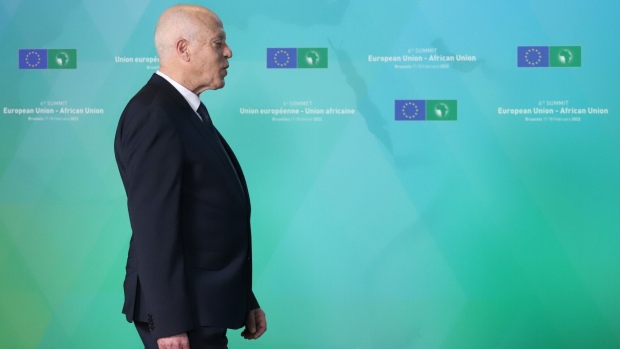Apr 6, 2023
Tunisia Leader Rejects IMF’s ‘Diktats,’ Preaches Self-Reliance
, Bloomberg News

(Bloomberg) -- Tunisian bonds plunged the most worldwide after President Kais Saied signaled he’ll reject a bailout from the International Monetary Fund, adding to concern that the cash-strapped nation is headed toward default.
The nation’s dollar bonds due 2025 dropped 4.1 cents to 51.38 cents on the dollar on Thursday, the lowest on record. Tunisian debt has been trading as “distressed” since 2021, meaning at least 10 percentage points higher than similarly-dated US Treasuries. The country’s bonds in euros and yen also plunged.
Saied’s latest comments are the clearest to date on where he stands regarding a $1.9 billion bailout for which Tunisia and the IMF reached a staff-level agreement in October. The deal has yet to be reviewed for approval by the multilateral lender’s directors.
Foreign ‘Diktats’
“Regarding the IMF, the diktats that come from abroad and cause only more impoverishment are rejected,” Saied said Thursday in response to a question on whether he would sign off on the agreement. Asked about the alternative to an IMF bailout, he repeated twice: “The alternative is that we must rely on ourselves.”
Saied, who consolidated near-total power in 2021, cited bread riots that erupted in Tunisia 40 years ago after authorities adjusted food subsidies under a previous agreement with the IMF.
“They want us to listen to their talk,” he said. “We won’t listen to anyone except God and the voice of the people.”
Amid protracted talks with the powerful UGTT trade union, Tunisian authorities have yet to finalize a package to cut spending on subsidies and the nation’s massive public sector.
‘Deep End’
The delay has raised concerns of default, which would exacerbate an already dire social and economic crisis that has pushed the highest number of Tunisians to flee their country since the revolution that started the Arab Spring in 2011.
Tunisia’s “economy risks falling off the deep end” without the IMF bailout, US Secretary of State Antony Blinken told the US Senate in March.
Saied’s continued crackdown on his opponents and his role in fanning a wave of mob violence against Black migrants in the country have drawn international condemnation, including from the United Nations, the US, European Parliament and the IMF.
Members of the US House of Representatives urged the administration to “ensure that any US foreign assistance to Tunisia supports the restoration of inclusive, democratic governance and rule of law.”
Saied has said he is only enforcing the law to protect the nation from chaos. On Thursday, amid growing speculation over his health, the 65-year old leader said he isn’t thinking for now about standing for reelection in 2024.
“Of course, there are elections and the people are the referee,” he said, adding the caveat that he won’t let an “unpatriotic” successor take over.
(Recasts with details, quotes and background)
©2023 Bloomberg L.P.





